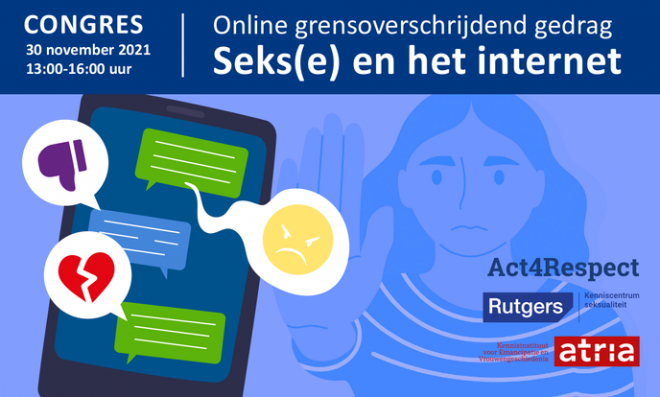Date: 30-11-2021Time: 13:00Location: online
The Internet has become an important place for young people to discover, explore and develop their gender and sexual identity. Social media allows you to express who you are or who you would like to be. On social media, online platforms and in chat rooms, information, photos and videos are shared all day long. Online dating, flirting and sharing intimate images become easier as a result.
At the same time, you are more vulnerable to transgressive behavior online. You can create a profile on social media anonymously and in many cases you do not always have control over what happens to your shared content. Online transgressive behavior comes in forms from cyberbullying and online hate to forms of online sexual violence such as unwanted sexting, grooming and revenge porn. As a professional, it can be difficult to discuss online behavior with young people, to strengthen online resilience and to identify transgressive behavior in time. How do you make online behavior discussable? And how can you as a professional contribute to a fun and safe online environment?
Research on online sexual harassment
Recent figures from the CBS showed that young people were the most frequent victims of online sexual harassment: "Young people are clearly the most frequent victims of online sexual harassment, especially young women: almost 30 percent of 16- to 18-year-olds and 23 percent of 18- to 24-year-old women say they have been confronted with it." Bisexual women and gay men were also more likely to experience unwanted behavior than their heterosexual peers. The study also revealed that victims mainly sought help from their informal network, but 4.4% talked to a social worker and 2.2% sought contact with the police. It is therefore very important that professionals are given the right tools to identify sexual harassment (early on) and to deal with it effectively.
Panel discussions and lectures
On Tuesday, November 30, Atria and Rutgers would like to engage in a discussion with experts by experience, young people and professionals to share knowledge, experiences and insights about online violence. They will delve deeper into topics such as online sexual harassment and online hate, taking into account different perspectives and backgrounds. The goal is to work with professionals to create a safer environment for young people to shape the online search for their gender and sexual identity. Through the collaboration with SPUI25, the entire program will be available online via a live stream.
The program will be hosted by journalist, presenter and Propaganda reporter Charisa Chotoe.
Speakers
Dr. Marijke Naezer is a cultural anthropologist and gender studies scholar. She works as an independent researcher, speaker, author and consultant. In 2018 she received her PhD on a study of how young people shape sexuality through social media. She also conducted research on the unwanted distribution of sexting material by Dutch youth.
Tofik Dibi is a writer and politician. Last year he started the #StopShaming campaign against online shaming and expose accounts.
Robin Griffin is a photography student. She herself was a victim but also a perpetrator of online slutshaming and is now committed to a safe environment where you can be proud to show yourself. She made a photo exhibition around online slutshaming and speaks at high schools about her experiences with the everyday distribution of (fake) nude photos.
Mignon Nusteling is an artist and poet, and also known for her Instagram account @Mignonnus where she unabashedly addresses topics such as art, autism, cyberbullying, sexuality and feminis
